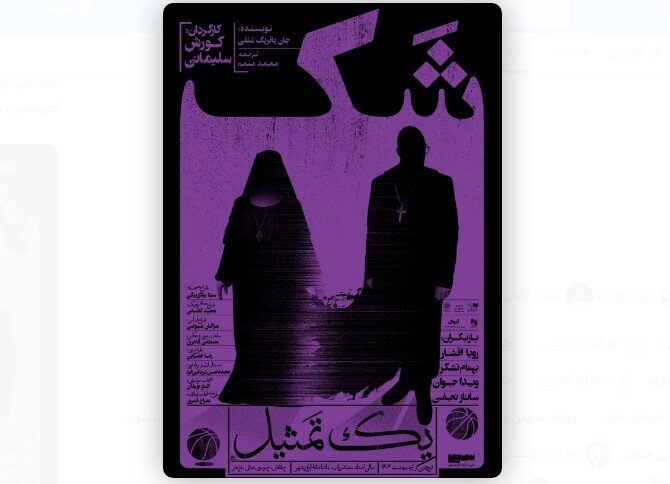“Doubt: A Parable” on stage at Tehran theater

TEHRAN- An adaptation of American playwright and screenwriter John Patrick Shanley’s “Doubt: A Parable” is currently on stage at Iranshahr's Samandarian Hall in Tehran.
Kourosh Soleimani is the director and producer of the play, which has been translated into Persian by Mohammad Mon’em.
Roya Afshar, Behnam Tashakor, Vida Javan and Sanaz Najafi are the main members of the cast for the play, which will remain on stage until May 9.
First performed off-Broadway at the Manhattan Theatre Club in 2004, "Doubt: A Parable" made a successful transition to the Broadway stage at the Walter Kerr Theatre in March 2005, ultimately closing in 2006, after 525 performances and 25 previews.
The play garnered critical acclaim, winning the Pulitzer Prize for Drama in 2005 and the Tony Award for Best Play. In 2008, it was adapted into a feature film, also titled "Doubt," starring Meryl Streep as Sister Aloysius and Philip Seymour Hoffman as Father Flynn, receiving several Academy Award nominations.
Set in the fictional St. Nicholas Church School in the Bronx during the fall of 1964, the play opens with Father Flynn, a progressive and popular parish priest, delivering a sermon on the theme of uncertainty. He states, "Doubt can be a bond as powerful and sustaining as certainty," setting the stage for the moral complexities that ensue.
The play introduces Sister Aloysius, the school's strict principal, devoted to her order, the Sisters of Charity, who believes in constant scrutiny of her students and staff. In a meeting with Sister James, a young and impressionable nun, Aloysius reveals her deep-seated mistrust towards nearly everyone around her, providing a stark contrast to Flynn’s inclusive and modern approach.
The tension escalates when Aloysius learns from Sister James that Father Flynn has had a private meeting with Donald Muller, the school's first African-American student. Suspecting potential misconduct, Aloysius confronts Flynn about her concerns under the pretense of discussing the Christmas pageant.
Flynn vehemently denies any wrongdoing, claiming he was merely disciplining Donald for drinking altar wine. Sister James finds solace in Flynn's explanation, in stark opposition to Aloysius's growing suspicions.
Determined to uncover the truth, Aloysius meets with Donald’s mother, Mrs. Muller, who surprisingly supports Flynn, dismissing Aloysius’s accusations. Over the course of their conversation, Mrs. Muller suggests that Donald may be experiencing abuse at home, adding another layer of complexity to the narrative.
As the conflict deepens, Flynn threatens Aloysius with possible repercussions if she does not retract her claims.
Aloysius reveals her deceptive tactics; she fabricated a phone call to Flynn's previous parish while claiming to have found a history of misconduct.
Despite this deception, her actions leave her with lingering doubt, just as they instill uncertainty in the audience.
Ultimately, the play concludes without a definitive resolution regarding Flynn's guilt or innocence, compelling the audience to grapple with the theme of doubt and its implications on faith, authority, and community.
SAB/
Leave a Comment